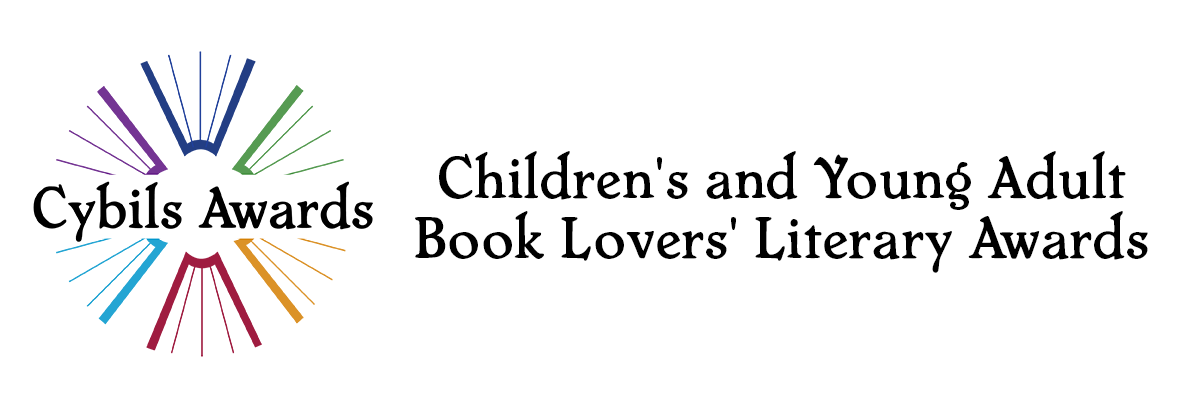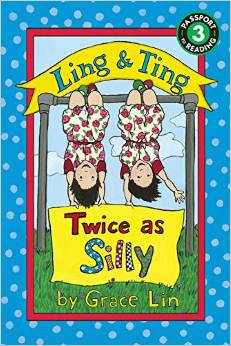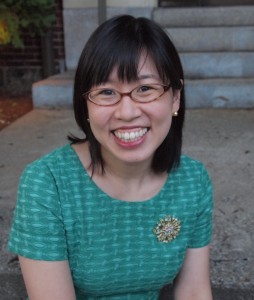First off, congrats! We adored Ling and Ting: Twice as Silly. Can you tell us a bit about how you came up with the idea for the book?
Thanks! I was so thrilled that Ling and Ting received a Cybil!
Ling and Ting started as a picture book originally titled Ling, Ting and Ming (sorry, Ming, you got axed). In my youth, I had loved the Flicka, Ricka and Dicka picture books—so much so that I have always harbored a not-so-secret wish that I, myself, was a triplet. And since, for me, writing is always some kind of wish fulfillment,I made Ling, Ting and Ming Asian-American.
So, I made it into a book dummy but even though I loved it, there was something about it that made me feel uncomfortable. Slowly, I realized the book was unintentionally reinforcing the “all Asians look alike” stereotype. And as much as I wanted Ling and Ting (and even Ming) to be born, I knew I didn’t want them to be seen in the world that way.
I attempted to revise, adding, cutting—even making the characters into animals. But nothing felt right. So I put the story away and let the idea sit and sit. For years.
And then in 2005, a group in Portland, ME put on a play of the Ugly Vegetables. There, I met the cutest Asian twin girls I’ve ever seen. As I watched them share cookies but eat them in completely different ways, a light went off in my head. In the past the theme of many of my other books have been how even when people look different, there are many similarities—but suddenly, I knew the theme of this book should be how when people look the same, there are many differences.
And I also realized that was for this idea, the picture book format wasn’t right. A picture book was too distilled, too pure. This idea needed nuances; it needed more story layers that a picture book couldn’t give it, but an early reader could.
So, Ling and Ting—the early reader was born!
Why did you choose to write a series about a set of twins?
(answered above!)
Alexandre Ferron
You’ve written books for different age levels. What are the challenges/rewards in writing for children who are just beginning to learn to read?
In many ways, an early reader is harder than writing novels or picture books, because the writing has to be so disciplined. There are all these kinds of rules that my editor and I researched. In general, you shouldn’t have more than 10 words per sentence and your words shouldn’t have more than three syllables. We tried to keep every word at a grade one or two level of vocabulary, which was hard. For example, in one of the stories in the first book, Ling does a magic trick. The word “magic” is in the correct level, but “magician” is not. So I had to figure out ways to write the stories without using words that were too hard.
But I think all the work is worth it. How can we expect kids to love reading if the learning to read books aren’t good? Creating a good early reader means you are helping to create a good reader.
You also did the illustrations for the book. Can you talk a bit about your approach to illustrating? Do you write the book first, then illustrate it; or do you do them in tandem?
Well, for me, the writing comes first. Once and a while, a single image will come to me that will inspire and idea but the actual illustrations for the book comes after the writing is done. But I confess, if there are things I like to illustrate (say, cupcakes!) I’ll write it into the story.
If you don’t mind telling us, what are you working on next?
Well, I just finished the art for my next novel, “When the Sea Turned to Silver” out in October 2016! It’s another companion book to “Where the Mountain Meets the Moon,” with familiar (Minli is in this one, though readers will have to figure out which character is her!) as well as new characters, legends and beasts! The cover of the book features a Chinese mythological beast called a longma–a half-dragon and half-horse! I hope people look for it in the fall!
Other than that, I’m finally making a return to picture books! It’s still a work-in-progress, so I won’t say more except that I’m very excited. Unfortunately, the Ling and Ting series won’t be continuing (though I won’t say I don’t have dreams of another one, some day) but I do have other early reader ideas bouncing around in my head. We’ll have to see if any stick!
Thank you so much for your time!


